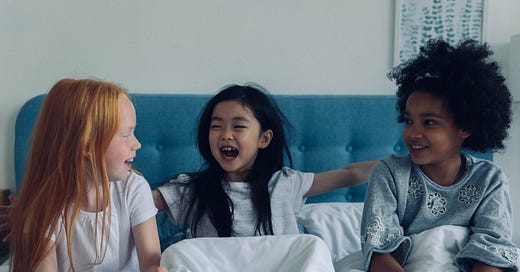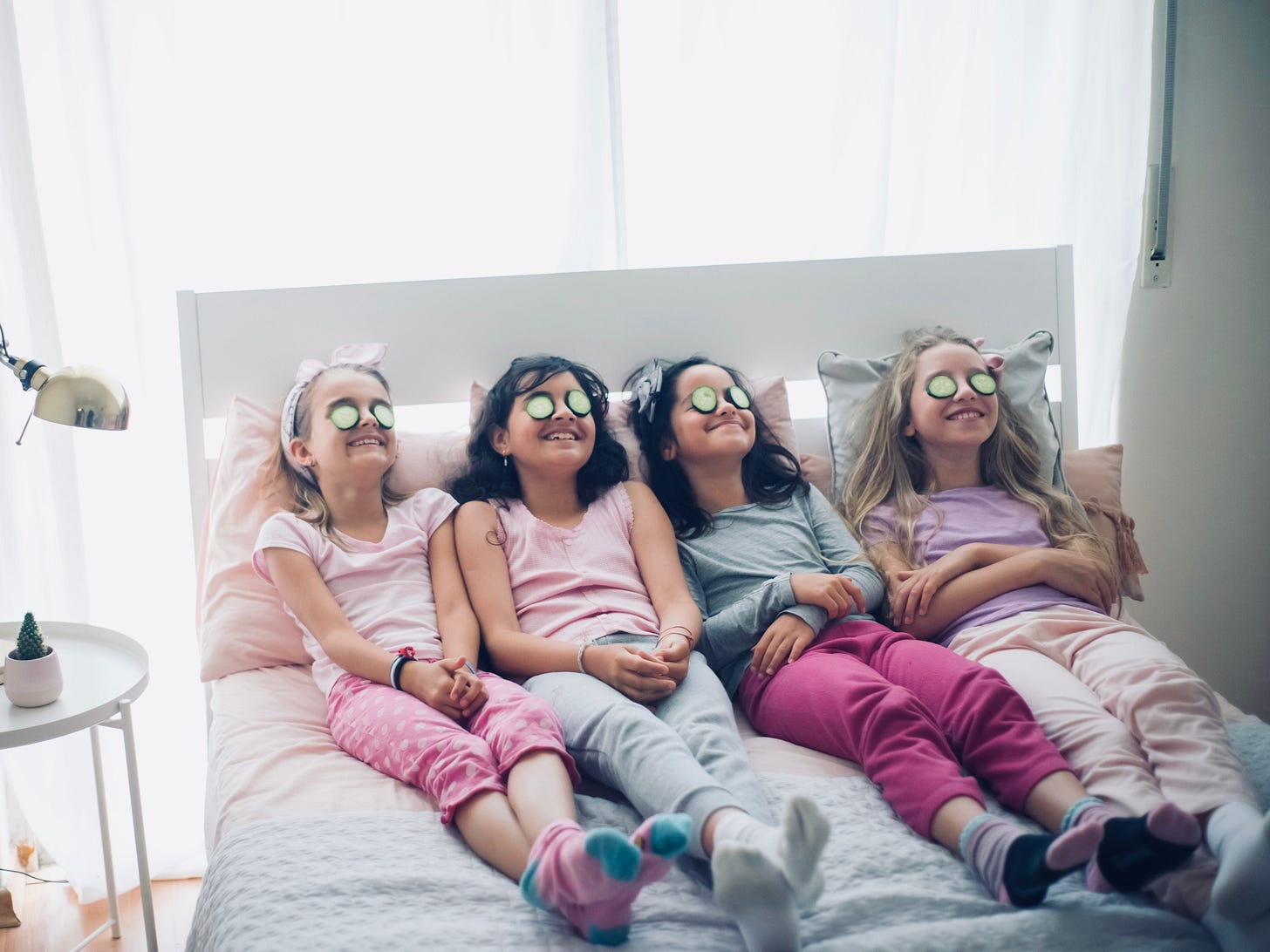Let the Kids Have Sleepovers
They get to see how other families live, which is a valuable lesson.
I was stunned when I once heard Canadian marketing professor Gad Saad say in an interview that he doesn’t let his kids go to sleepovers or overnight camps. Though it has been a while since I heard the actual conversation, the gist of it was that he couldn’t control what might happen to his children at someone else’s house—and if some worst-case scenario were to transpire, it would be too late for him to intervene by the time he found out. Relinquishing his kids to a stranger’s house risked undermining the one job he has, which is to raise his kids safely and relatively unscathed to adulthood.
This viewpoint rubs me the wrong way for a few reasons. First, it seems oddly paranoid, catastrophizing a situation that is almost always innocent and benign. The preoccupation with what could happen distorts the actual risk, which is that family members and close friends pose a much greater danger to kids than strangers. The vast majority (93%) of child sexual assault victims know their abuser; a mere 7% of abusers are strangers to a child.
Second, by refusing to let kids go to sleepovers, they are being denied an opportunity to individuate from the parent and handle situations on their own. They miss out on a much-needed chance to get off their phones, interact face-to-face with peers, and have some of the raucous fun that makes sleepovers so notable. If you repeatedly deny that freedom to a child who wants it, they will become less inclined to crave it as they grow—and then you could end up with a teenager who doesn’t leave the house.
You Can’t Control Everything
Saad appears to ignore the fact that you can never control everything that happens to your kid. They’re “at risk” on their way to school, driving in a car, in the classroom, at the grocery store, sitting in a movie theatre or restaurant, joining a traveling sports team, taking a music lesson, attending a medical appointment. You will drive yourself mad trying to bubble-wrap a kid to ensure that nothing bad ever happens to them. Your best bet is to give them real-life coping skills that ensure they don’t feel or behave like a victim. Focus on what you can control.
It turns out that he is not the only parent expressing sleepover skepticism these days. One psychiatrist father of six got millions of views for a TikTok video in which he says he’d never let his kids go to sleepovers. Many parents express fears over what their kids might see on screens, what food they could eat, whether there are guns or bed bugs in the house, if kids might try vaping, or what time they might go to bed.
Parents magazine recently posted a story that said increasing numbers of parents are opting for “sleep-unders” or “late-overs”, when the usual sleepover hours are adjusted to accommodate earlier or later departure times. But this seems like an oddly illogical solution to me, since the problems cited above are not limited to the hours between midnight and 5 a.m.
Sleepovers Teach Kids a Lot
Contrast this attitude with that of educator and author Erika Christakis, who recently wrote a piece for The Atlantic called “The Case for Sleepovers.” She acknowledged that sleepover skepticism is rampant right now, but argued that a no-sleepover policy prevents kids from learning how other families operate.
“Why would we want to deprive a child of the occasional strange or uncomfortable experience at another family’s house—even one that might directly conflict with our values or our preferred practices? Isn’t an understanding of human differences a bulwark against frailty and narcissism? We’re not talking about moving in with a new family, just spending the night!”
To be clear, it is important to know that your child is going to a home where he or she will be safe. I always do some pre-sleepover legwork to determine who the parents are, which of my friends know them (fairly easy in a small town), what their kid is like, how many siblings they have and what ages, where and how they live.
There have been some sleepover offers that I have felt compelled to reject on behalf of my kids, simply because I don’t have enough information to feel secure. But if I have a rough idea of who the family is, and I feel OK with it, and my kid really wants to go, then I let them go.
Christakis added that sleepovers taught her some valuable skills:
“I learned skills such as how to sleep in the dark, and talk with intimidating people, and tolerate teasing from someone’s older sibling. I also learned compassion, humility, and gratitude from sleeping at other people’s houses. I saw the generosity and indulgence families extended to me. I saw their pride in how they did things. I saw the brave faces they put on… Sleepovers, for all their flaws, humanized others, and as a result, they made me more human too.”
Like Christakis, I have keen memories from my own childhood sleepovers. Most are wonderful, like watching movies, having pillow fights, doing makeup and at-home spas, making cringy prank calls from the phone booth in town, and poring over teen magazines.
Some are less great. I remember staying at one girl’s house that was surprisingly filthy. There was a piece of furry ham in the corner of her bedroom, and the bathtub was filled with cold water and dog hair, because apparently her water-loving dog liked to use it periodically. I came home more appreciative than ever of my own clean-ish home.
I remember watching my friends’ moms chain-smoke at the dining table and feeling relieved that my parents didn’t smoke. My friends and I sneaked peeks at one dad’s collection of calendars featuring bikini-clad models on motorcycles, and I marvelled at how different these women looked from any woman I had ever met in rural Ontario. We gorged ourselves on junk food (Lipton’s chicken noodle soup, Cheez-Whiz, dill pickle chips, strawberry milk) that I would never get at home.
And I loved it all. It helped me to understand that there were people who lived very differently from my artsy, intellectual parents who ate lentils, read design magazines, wore wool sweaters, and considered “hiking” to be their hobby. Of course, I grew up to be more like my own parents than any of the parents I met as a kid, but thanks to those years of once- or twice-monthly sleepovers with my friends, it feels a tiny bit more like a conscious choice than a default one. Those memories helped me to decide what kind of home I wanted to have someday.
So, the next time your kid asks to have a sleepover, consider it seriously. Think about all that they stand to gain from the experience. If you’re truly uncomfortable, consider inviting the other child to your home first to get a better sense of who they are, or start with daytime hangouts before moving to overnights. But realize that kids need this in-person time more than ever these days, and throwing up roadblocks to their efforts to organize it may only harm them in the long run.
In Other News:
My gorgeous new website has launched! Please check out katherinemartinko.ca to learn more about the work I do, which includes writing, freelance editing, and public speaking about digital minimalism to groups of all sizes. Last week, I did a presentation at the Toronto Waldorf School; the week before, I was at a school in Collingwood, ON. I also do Zoom talks for faraway locations, such a recent presentation to a CFUW chapter in Vancouver, British Columbia. Get in touch if you know a group that would like to hire me to speak!
Check out my latest article for the Let Grow blog: “How to Get Kids to GO Outside and PLAY Outside” (March 5, 2024). It got a helpful shout-out from Jonathan Haidt on Twitter:
I recently set up pledges for The Analog Family. If you enjoy my work, please consider making a financial pledge. This newsletter is a labour of love thus far, but it takes a lot of time and energy! Pledges are a wonderful motivator for this work that I consider to be more important than ever.
As always, you can show support by buying my book and leaving a review!
You Might Also Like:
Seventeen Seconds
Every Kid Hates Practicing Music
When Adults Help Kids







We just had this debate last night. With all but one kid (her situation is unique,) we do not allow sleepovers. I’m not worried about their physical safety or abuse. I just think very little that happens between 12-5am is good. We have a work around - they are in scouts and go camping. That gives them alone time in tents with friends. We also allow cousin sleepovers. By high school, I’m much more inclined to allow sleepovers.
For us, the magazines and the movies and the bullying just aren’t worth it. I know very few people who have positive memories of sleepovers. I’m trying to learn to let my kids have more independence, but I try not to put them in situations where our morals are compromised. I’m not worried about them not being able to build up defenses to peer pressure because school provides plenty of opportunities for that.
This is all very prescient to me as I learn the value of letting go and letting kids have more independence. There’s just some things (sleepovers) that I just can’t get myself to budge on.
I loved sleepovers because they got me out of my house! I was always the kid who got up early and so many kind mothers, who probably got up early for some alone time, welcomed me to join them in the kitchen. I grew up in a less than happy house, so I learned a lot from these mornings with adults that weren't my parents. I hope my son grows up in a kinder household, but I still want him to see how other families do things and be able to get along without me. I am definitely going to be open to hosting sleepovers at our house and allowing him to go to them.
I also had so much fun being around other girls. My favorite girl scout camp memory is when we got caught in a hurricane and had to move camp into a big cabin with two other troops. It felt like the best version of an orphanage and I never wanted to leave.